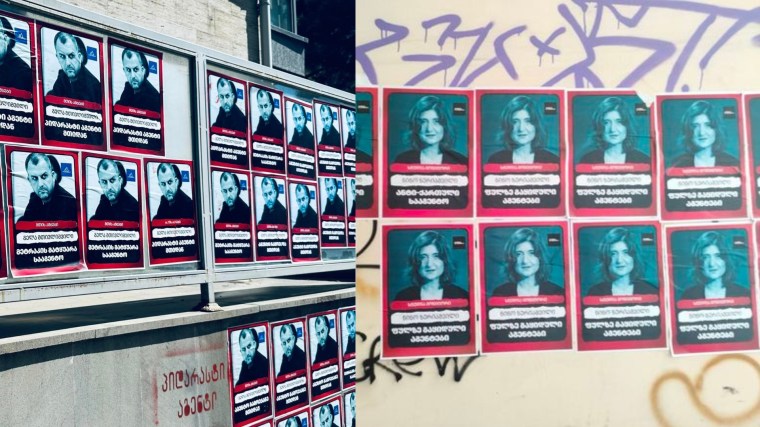Stockholm, May 10, 2024—Georgian authorities should thoroughly investigate widespread harassment and threats against journalists covering a bill that would designate media outlets as “foreign agents” and Parliament should reject the draft law, the Committee to Protect Journalists said Friday.
Since May 7, more than 30 journalists covering the bill “on transparency of foreign influence” and public protests against it have been targeted with anonymous abusive and threatening phone calls, journalists from 10 different independent news outlets told CPJ.
On May 9, Nino Zuriashvili, head of Studio Monitor, which makes investigative documentaries, and Gela Mtivlishvili, editor-in-chief of the independent website Mountain News, told CPJ that unknown individuals covered the entrances to their offices with posters and graffiti denouncing them as “foreign agents.”
Tamta Muradashvili, director of independent broadcaster Mtavari Arkhi, told CPJ that more than 10 of her colleagues had received threatening and abusive calls. She said she believed it was “very clear that the campaign is coordinated by government agencies,” given its scale, the callers’ access to government-held personal data, and the lack of response from the authorities.
“Increasing threats and intimidation against journalists in Georgia are deeply concerning and demonstrate that the ‘foreign agent’ bill not only unjustly restricts and stigmatizes journalists but also makes them more unsafe,” said Gulnoza Said, CPJ’s Europe and Central Asia program coordinator, in New York.
“With the eyes of the world on Georgia over this bill and the country’s hopes of joining the European Union, the authorities should know their reputation is on the line if they don’t conduct a swift and convincing investigation into acts of intimidation against journalists and ensure media workers’ safety.”
Hundreds of critics of the bill reportedly received threatening phone calls, offices of numerous organizations were targeted with posters, and at least six prominent opposition politicians and activists were beaten this week.
The bill would require media outlets and nonprofits receiving more than 20% of their income from abroad to register as “organizations pursuing the interests of a foreign power.” Parliament is expected to pass the bill in a third and final reading by May 17.
‘No place in Georgia for agents’
Zuriashvili told CPJ that a man called her from an international number on May 7, asked if she was from Studio Monitor, swore at her, and asked why she was critical of the foreign agent bill.
Zuriashvili posted a photo on Facebook of her office door, showing graffiti that she found on May 9, written “agents’ HQ” and printed posters showing her face, name, and Studio Monitor’s logo, with the words, “There is no place in Georgia for agents.”
On May 10, unknown individuals plastered dozens of posters on the façade of Zuriashvili’s apartment and graffitied her car with obscene images and the phrase “agent who sold themselves for money,” the news website Netgazeti reported.
Mountain News also posted images of dozens of similar posters and graffiti that were found to have been plastered on the walls of Mtivlishvili’s home and the outlet’s office on May 9.
On May 8, Natia Kuprashvili, founder of independent broadcaster TOK TV, said on Facebook that an unidentified caller recited her address and said they were waiting for her at her apartment.
Zuriashvili, Mtivlishvili and several other journalists told CPJ that they believed they were targeted for their vocal opposition to the foreign agent bill and for their outlets’ critical coverage of the bill and Georgian authorities.
Parliament Speaker Shalva Papuashvili said on May 8 that authorities would create a public online register of individuals who were “involved in violence, other illegal actions, threats and blackmail, or publicly approve of such actions.” Muradashvili said such a register would likely be used against critics of the bill and that the authorities’ announcement of the register amid the intimidation campaign demonstrated their repressive direction.
CPJ also spoke to journalists at the independent broadcasters TV Pirveli and TV Formula and at the news websites JAMnews, OC Media, Netgazeti, Batumelebi, and Georgian News who all said that their staff had been targeted with threatening calls.
CPJ’s emails requesting comment from the ruling Georgian Dream party, and email and Facebook message to the Special Investigation Service, which investigates allegations of crimes against journalists, did not immediately receive any replies.
